| Site menu |
|
 |
| Search |
|
 |
| Our poll |
|
 |
| Statistics |
Total online: 1 Guests: 1 Users: 0 |
 |
| Login form |
|
 |
|
Main » Entries archive
Views:
25769
|
Added by:
Riffmaster
|
Date:
2011-10-13
|
|
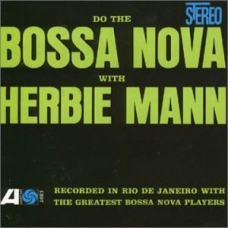 Herbie Mann travelled to Rio in 1962 and came back with the album "Do
the Bossa Nova", today a classic example of that happy marriage of jazz
and Brazilian popular music. He teamed with Castro Neves, Baden Powell
and the great Tom Jobim, the composer of Quiet Nights and The Girl from
Ipanema to cover bossa nova standards and more percussive mainstream
samba numbers. The result is irregular but always inspired and worth
listening. The track Consolação, a dueto of flute and guitar, Mann and
Powell, is hypnotic! (by Oto A. Maia) Herbie Mann travelled to Rio in 1962 and came back with the album "Do
the Bossa Nova", today a classic example of that happy marriage of jazz
and Brazilian popular music. He teamed with Castro Neves, Baden Powell
and the great Tom Jobim, the composer of Quiet Nights and The Girl from
Ipanema to cover bossa nova standards and more percussive mainstream
samba numbers. The result is irregular but always inspired and worth
listening. The track Consolação, a dueto of flute and guitar, Mann and
Powell, is hypnotic! (by Oto A. Maia)
Rather than play a watered-down version of bossa nova in New York
studios (which was becoming quite common as the bossa nova fad hit its
peak in 1962), flutist Herbie Mann went down to Brazil and recorded with some of the top players of the style. Guitarist Baden Powell and the group of then-unknown pianist Sergio Mendes, which included drummer Dom Um Romao, formed the nucleus for this generally delightful album. Antonio Carlos Jobim
himself dropped by to sing two of his compositions, including "One Note
Samba," and even on the token jazz standard "Blues Walk," the music is
as much Brazilian as it is jazz. This "fusion" works quite well; pity
that the performances last appeared on this out-of-print LP. (by Scott Yanow)Personnel:
Octavio Bailly Jr. (bass)Durval Ferreira (guitar)Gabriel (bass)
Antonio Carlos Jobim (piano on 05.)Juquinha (drums on 02. + 06.)Herbie Mann (flute)Paulo Moura (saxophone)
Sergio Mendes (piano)
Papao (drums)
Pedro Paulo (trumpet)
Baden Powell (guitar)Dom Um Romao (drums on 03. - 05.)
Luis Carlos Vinhas (piano on 08.)Tracklist:
01. Deve Ser Amor (It Must Be Love) (DeMoraes/Powell) 4.19
02. Menina Feia (Ugly Guirl) (Castro-Neves) 5.32
03. Amor Em Paz (Love In Peace) (DeMoraes/Jobim) 2.37
04. The Blues Walk (Brown) 4.24
05. One Note Samba (Hendricks/Jobim/Mendonca) 3.22
06. Blues Walk (Brown) 4.0807. Consolaçao (Powell/DeMoraes) 4.2708. Bossa Velha (Old Bossa) (Mann) ARMU 0076
Views:
3261
|
Added by:
Riffmaster
|
Date:
2011-08-31
|
|
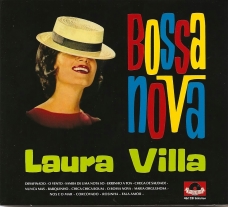 Shamefully forgotten for years, this sumptuous album is an
essential classic in terms of several tracks. Historically, it is one of
the first Bossa Nova records to be recorded in Europe, Paris to be
precise, the welcoming spot and creative home for a major Brazilian
Diaspora. Shamefully forgotten for years, this sumptuous album is an
essential classic in terms of several tracks. Historically, it is one of
the first Bossa Nova records to be recorded in Europe, Paris to be
precise, the welcoming spot and creative home for a major Brazilian
Diaspora.
Amongst them, we find the musician Silvuca, behind a large majority of
the shimmering arrangements on this record, perfectly showcasing Laura
Villa’s warm and enveloping voice. Born Emilie Laura Facetti in Italy,
she would discover Bossa Nova’s captivating melodies when in Lisbon at
the end of the 50’s. At the time, the Portuguese capital was the
European port entry for newly arrived Brazilians, and as such, it was
here that the songs composed by Dorival Caymmi, João Gilberto, Antônio
Carlos Jobim, Vinícius de Moraes and Luiz Bonfa received their first
rapturous reception.
With her pianist husband Alex Biancheri, she was under Bossa’s spell
on her return to Paris, and decided to spread the good Brazilian word.
Signing to Polydor gave her the means to form a full-scale orchestra
(partly made up of Brazilian musicians) and to record in 1962 this
classics-filled album also comprising original material.
A shining declaration of love for Brazilian rhythms, a veritable
manifesto of proud and uninhibited European Bossa, this timeless
masterpiece brimming with bright and generous songs lit up the way to
Brazil’s infinite softness at the dawn of the 60’s. A path that will be
taken by many more to come.
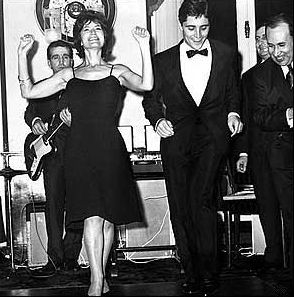
Laura Villa w/ Sacha Distel Personnel:
Alex Biancheri" (piano)
Laura Villa (vocals)
+
a bunch of unknown studio musicians
Tracklist:
01. Desafinado (Jobim/Mendonca) 2.31
02. O Vento (Biancheri/Barbosa) 2.28
03. Samba De Uma Nota So (Jobim/Mendonca) 2.23
04. Errinho A Toa (Menescal/Boscoli) 2.15
05. Chega De Saudada (Jobim/DeMoraes) 2.57
06. Nunca Mas (Lincoln/Cézar) 2.05
07. Barquinho (Menescal/Boscoli) 2.33
08. Chica Chica Boum (Verlane) 2.25
09. O Bossa Nova (Barbosa/Garro) 2.15
10. Maria Orgulhosa (Secicias/Barbosa/Cempos) 2.45
11. Nos E O Mar (Menescal/Boscoli) 2.05
12. Corcovado (Jobim) 2.27
13. Rosinha (Sivuca) 2.00
14. Fala Amor (Ferreira/Antonio) 2.39
ARMU 0075
Views:
2219
|
Added by:
Riffmaster
|
Date:
2011-08-30
|
|
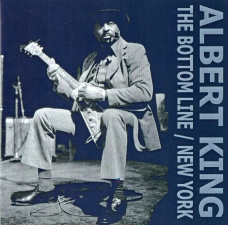 Albert King is truly a "King of the Blues," although he doesn't hold that title (B.B. does). Along with B.B. and Freddie King, Albert King
is one of the major influences on blues and rock guitar players.
Without him, modern guitar music would not sound as it does -- his style
has influenced both black and white blues players from Otis Rush and Robert Cray to Eric Clapton and Stevie Ray Vaughan. It's important to note that while almost all modern blues guitarists seldom play for long without falling into a B.B. King guitar cliché, Albert King never does -- he's had his own style and unique tone from the beginning. Albert King is truly a "King of the Blues," although he doesn't hold that title (B.B. does). Along with B.B. and Freddie King, Albert King
is one of the major influences on blues and rock guitar players.
Without him, modern guitar music would not sound as it does -- his style
has influenced both black and white blues players from Otis Rush and Robert Cray to Eric Clapton and Stevie Ray Vaughan. It's important to note that while almost all modern blues guitarists seldom play for long without falling into a B.B. King guitar cliché, Albert King never does -- he's had his own style and unique tone from the beginning.
Albert King
plays guitar left-handed, without re-stringing the guitar from the
right-handed setup; this "upside-down" playing accounts for his
difference in tone, since he pulls down on the same strings that most
players push up on when bending the blues notes. King's
massive tone and totally unique way of squeezing bends out of a guitar
string has had a major impact. Many young white guitarists -- especially
rock & rollers -- have been influenced by King's playing, and many players who emulate his style may never have heard of Albert King,
let alone heard his music. His style is immediately distinguishable
from all other blues guitarists, and he's one of the most important
blues guitarists to ever pick up the electric guitar. (by Stephen Thomas Erlewine)
This is an excellent FM broadcast recording featuring Dickey Betts from The Allman Brothers Band ... hey ... let´s jam together !
Personnel:
Albert King (guitar, vocals)
Dickey Betty guitar on
+
a bunch of unknown musicians
Tracklist:01. Intro Jam (King) 5.19
02. Born Under A Bad Sign (Jones/Bell) 6.54
03. Oh Pretty Woman (King) 5.00
04. Blues Power (King) 12. 34
05. Jam (King/Betts) 12.28
06. Crosscut Saw/Closing Jam (Ford/King) 9.46ARMU 0074
Views:
3033
|
Added by:
Riffmaster
|
Date:
2011-08-30
|
|
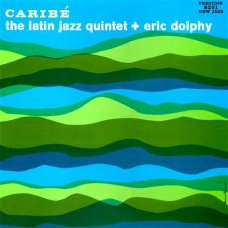 A masterful meeting of Eric Dolpy and The Latin Jazz Quintet -- a record
that shows a rare Latin side of Dolphy's talents, but one that's
totally great! A masterful meeting of Eric Dolpy and The Latin Jazz Quintet -- a record
that shows a rare Latin side of Dolphy's talents, but one that's
totally great!
The core group here are the ensemble led by conga player
Juan Amalbert with vibes, piano, bass, and percussion -- a group who
helped push the Latin jazz style of earlier 50s work into much hipper
territory during the 60s -- usually by adding in a reedman like Dolphy!
Eric's blowing here on alto, flute, and bass clarinet -- showing a great
sensitivity to the core groove of the record, but also managing to cut
in these edgier moments that really open things up!
The mix of vibes and
Dolphy alone is worth the price of admission -- especially when heard
in an "inside" way that's quite different than his later meeting with
Bobby Hutcherson -- but the overall groove really holds the record
together wonderfully, and makes it appealing for fans of both Latin and
modern jazz! (by dusty groove)
Recorded at Rudy Van Gelder Studio, Englewood Cliffs, NJ, August 19, 1960Personnel:
Eric Dolphy (saxophone, clarinet,flute)
Bill Ellington (bass)Manny Ramos (drums, percussion)
Carlie Simons (vibraphone)
Tracklist:
01. Caribe (Casey) 10.05
02. Blues In 6/8 (Amalbert/Ricci) 5.45
03. First Bass Line (Casey) 4.05
04. Mambo Ricci (Amalbert/Ricci) 6.55
05. Spring Is Here (Rodgers/Hart) 5.06
06. Sunday Go Meetin' (Casey) 5.50 ARMU 0073
Views:
1960
|
Added by:
Riffmaster
|
Date:
2011-08-30
|
|
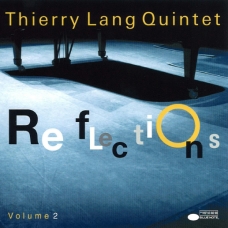 Reflection Volume 2 is the second album in a trilogy of albums released by Thierry Lang all comprising his original compositions. Reflection Volume 2 is the second album in a trilogy of albums released by Thierry Lang all comprising his original compositions.
In Reflections 2 Paolo Fresu on trumpet and Andy Scherrer on saxophone join the trio which performed on Reflections 1.
The result combines Thierry Lang´s traditional melodic jazz with some outstanding horn and saxophone playing.
Most of Lang´s recordings were with bass and drums only. Here you can listen how good his music and his composition works in a Quintet.
This album is another perfect example of first class European jazz.Personnel:
Paolo Fresu (trumpet)
Heiri Känzig (bass)
Thierry Lang (piano)
Andy Scherrer (saxophone)Peter Schmidlin (drums) Tracklist:
01. Choral (Lang) 6.55
02. Les Petits Yeux (Lang) 4.11
03. Un Petit Bleu (Lang) 3.40
04. Tender Awakening (Lang) 5.43
05. Tango de Rio (Lang) 5.24
06. One For Foutch (Lang) 5.28
07. Vendredi 18 (Lang) 6.10
08. Montmartre (Lang) 5.25
09. Bambou (Lang) 3.24ARMU 0072
Views:
1611
|
Added by:
Riffmaster
|
Date:
2011-08-29
|
|
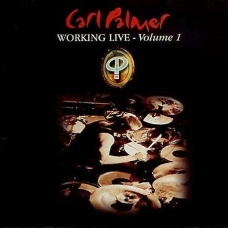 Whilst Carl Palmer´s live band is now sporting a
new young guitarist (sorry don't know his name), due to Steve Baxter
(who plays on this album) suffering from severe tinnitus following a car
crash, their styles and skills are very similar and at first I couldn't
believe that the guy playing on Working Live Vol 1 wasn't the one I
saw in concert. Whilst Carl Palmer´s live band is now sporting a
new young guitarist (sorry don't know his name), due to Steve Baxter
(who plays on this album) suffering from severe tinnitus following a car
crash, their styles and skills are very similar and at first I couldn't
believe that the guy playing on Working Live Vol 1 wasn't the one I
saw in concert.
All of the tracks will be well known to ELP fans,
but you will never have heard them like this before. Barbarian opens the
album and sets the scene for what is to come; oh-so-heavy brooding and
intricate bass from the greatly talented Dave Marks, coupled with
blistering guitar from Steve Baxter and, of course, pounding, weaving
mesmerising percussion from the master himself. Enemy God from "Works"
is an even greater vehicle for Carl to display his mighty skills. LA
Nights, which ELP fans will remember featuring Joe Walsh on "Works" has a
slightly more jazzy/bluesy feel and contrasts nicely with the more
gothic material here (and also has an almost miraculous guitar outro),
whereas the seminal Tank is supremely evocative. Bullfrog is, for me,
perhaps the only slightly disappointing track, as it comes over as less
tight and more discordant than the rest and with no particularly
enjoyable melody. It does, however have some scorchingly fast guitar
work to redeem it. Then we have the album's highlights; Ginastera's
Tocatta from the classic "Brain Salad Surgery" album is nothing short of
a masterpiece here. This eerie and magnificent piece has never sounded
better. Then Canario (probably the only good thing from the
disappointing "Love Beach" album) gives the axeman par excellence a
chance to display his ample skills and will have you agog with awe. Carl
then rounds the album off with the drum solo to end all solos. Throughout
this set, the musicianship is stunning - rarely will you find three
musicians working so hard - each masters of their own art, but also
coming together to create something far greater than the sum of its
parts. This
music is heavy enough, grungy enough, gothic enough and above all,
inventive enough to appeal to far more than just ELP fans, so buy this
truly great live album now and play it LOUD! Also, do try to catch the
band live. I guarantee you won't be disappointed! (by Cartimand) 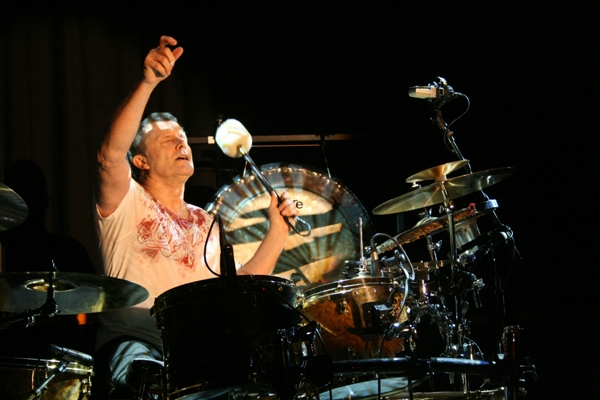
Personnel:
Shaun Baxter (guitar)
David Marks (bass)
Carl Palmer (drums)
Tracklist:
01. The Barbarian (Bartok) 5.54
02. The Enemy God Dances With The Black Spirits (Prokofiev) 3.07
03. L.A. Nights (Emerson/Palmer) 5.39
04. Tank (Emerson/Palmer) 4.4205. Bullfrog (Aspery/Hodgkinson/Palmer) 4.40
06. Toccata (Ginastera) 8.00
07. Canario (Rodrigo/Vidre) 4.42
08. Drum Solo (Palmer) 6.22ARMU 0071
Views:
4935
|
Added by:
Riffmaster
|
Date:
2011-08-29
|
|
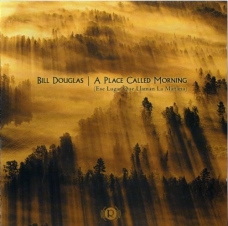 With his latest release, Bill Douglas once again defies all imagination
w/ this beautiful album. As in past recordings, he is again accompained on
several songs w/ the Ars Nova Singers. He is also accompained w/ various
instruments such as clarinet, cello, oboe, flute, violin, frame drum
and cymbals. Douglas himself plays piano, bassoon, and synthesizers. The
alternative flow of chorals & instrumentals is very soothing. If
you aren't familiar w/ the music of Bill Douglas, you are in for a treat
in purchasing this or any other of his wonderful cd's. In this
particular cd, he takes the poetry of W.B. Yeats, Emily Dickenson,
Rachel Faro and an excert from the Bibles' Song of Soloman and arranges
them into song. On previous other works, he has used a variety of other
poets. His music is so breathtaking and so beautiful, it is the ultimate
in serenity. If you are looking for some music to relax with, you've
come to the right place. But don't mistake this for 'some New Age stuff'
that comes and goes. It is certainly much more than that and you'd have
to hear it to truly understand and appreciate it. What incredible
God-given talent Douglas has! I know of no other artist who can take a
simple poem and arrange it musically, so that you feel overwhelmed with
it's beauty. What a masterful idea to combine poetry and music! I have a
chronic illness, so serentiy is a must in dealing w/ things. One way I
do that is through his music, which is my favorite to unwind & relax
with. This would make a really great gift for yourself or anyone in
your life, who is under alot of stress. Deep Peace is another good cd.
If you're looking for a compilation of some of his work, try Eternity's
Sunrise. Anytime I have one of his cd's on and someone happens to drop
by, they always comment on how beautiful it is and ask "Who is that!?!"
Also of interest are the poems themselves that Douglas has listed in the
liner notes. Nice to read them to yourself as they are being sung. A
Place Called Morning will soothe your mind and your spirit! Enjoy! With his latest release, Bill Douglas once again defies all imagination
w/ this beautiful album. As in past recordings, he is again accompained on
several songs w/ the Ars Nova Singers. He is also accompained w/ various
instruments such as clarinet, cello, oboe, flute, violin, frame drum
and cymbals. Douglas himself plays piano, bassoon, and synthesizers. The
alternative flow of chorals & instrumentals is very soothing. If
you aren't familiar w/ the music of Bill Douglas, you are in for a treat
in purchasing this or any other of his wonderful cd's. In this
particular cd, he takes the poetry of W.B. Yeats, Emily Dickenson,
Rachel Faro and an excert from the Bibles' Song of Soloman and arranges
them into song. On previous other works, he has used a variety of other
poets. His music is so breathtaking and so beautiful, it is the ultimate
in serenity. If you are looking for some music to relax with, you've
come to the right place. But don't mistake this for 'some New Age stuff'
that comes and goes. It is certainly much more than that and you'd have
to hear it to truly understand and appreciate it. What incredible
God-given talent Douglas has! I know of no other artist who can take a
simple poem and arrange it musically, so that you feel overwhelmed with
it's beauty. What a masterful idea to combine poetry and music! I have a
chronic illness, so serentiy is a must in dealing w/ things. One way I
do that is through his music, which is my favorite to unwind & relax
with. This would make a really great gift for yourself or anyone in
your life, who is under alot of stress. Deep Peace is another good cd.
If you're looking for a compilation of some of his work, try Eternity's
Sunrise. Anytime I have one of his cd's on and someone happens to drop
by, they always comment on how beautiful it is and ask "Who is that!?!"
Also of interest are the poems themselves that Douglas has listed in the
liner notes. Nice to read them to yourself as they are being sung. A
Place Called Morning will soothe your mind and your spirit! Enjoy!
Personnel:
Ty Burhoe (drums, tabla)
Peter Cooper
(oboe)
Bill Douglas (bassoon, piano, synthesizer)
Judith Glyde (cello)
Bil Jackson (clarinet)
Yumi Hwang (violin)
Timothy Quigley (cymbals)
Anne Stackpole-Cuellar (flute)
+
Ars Nova Singers (vocals)
Tracklist:
01. Lake Isle Of Innisfree (Douglas) 4.29
02. Emerald Dawn (Douglas) 3.58 03. Forest Hymn (Douglas) 4.1504. Morning Song (Douglas) 2.3805. Tara (Choral Version) (Douglas) 4.2106. Lovely Is The Rose (Douglas) 4.03 07. Golden Rain (Douglas) 3.5108. Wings Of The Wind (Douglas) 2.21
09. Spectrum Of Violet (Douglas) 5.2210. A Place Called Morning (Douglas) 5.0411. Intermezzo (Douglas) 3.42 12. Sadness Of The Moon (Douglas) 3.5613. Rise Up, My Love (Douglas) 4.08
ARMU 0070
Views:
1161
|
Added by:
Riffmaster
|
Date:
2011-08-28
|
|
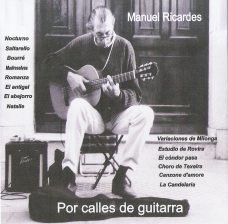 Manuel Ricardes is a more or less unknown spanish street musicians, who´s a real fantastic guitar player. He has a very special feeling for tango music and every night he sit in a corner of a street a play his fantastic music. I met him during my last vactions in Bilbao/Spain. Manuel Ricardes is a more or less unknown spanish street musicians, who´s a real fantastic guitar player. He has a very special feeling for tango music and every night he sit in a corner of a street a play his fantastic music. I met him during my last vactions in Bilbao/Spain.
I was very impressed by his way of playing the acoustic guitar. His repertoire has many colors and it´s up to you to explore and enjoy these different styles of acoustic music.He told me about the record that it was recorded in 2003 and this is his music he played on the streets of spanish cities.
Together with Beatriz Arbenoiz he although played in small music clubs all over Spain and try to keep the flame of tango music alive !This entry is dedicated to the street musicians all over the world who gave us so much pleasure by their way to entertain us during our shopping tours through a city.
Personnel:Manuel Ricardes (guitar)Tracklist:01. Bourre (Bach) 2.4002. Canzone d´amore (Liebermann) 2.0703. El abejorro (Pujol) 1.5704. El antigal (Toro/Diaz) 3.4505. El Condor Pasa (Traditional) 4.5206. Estudio de rovira (Traditional) 2.5407. La candelaria (Falú) 3.2408. Madreselvas (Amadoro/Canaro) 2.3609. Natalie (Moustaki) 1.3110. Nocturno (Soulés) 3.4011. Romanza (Soulés) 4.3012. Saltarello (Traditional) 1.0113. Choro de texeira (Traditional) 2.1214. Variaciones de milonga (Falú) 4.09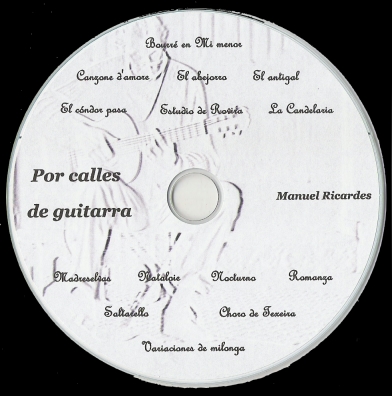
Views:
12641
|
Added by:
Riffmaster
|
Date:
2011-08-27
|
|
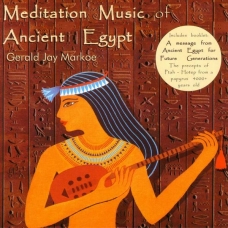 Gerald Jay Markoe studied classical music at both Juilliard (B.A.) and the Manhattan School of Music (M.A.). Since the early 1960s, Markoe
has studied meditation and astrology, and he specialized in translating
the positions of the planets into music, often recording custom tapes
based on a person's astrological sign. His first public album in 1988
was Music from the Pleiades, inspired by the famous poster of the
constellation. Markoe
formed his own music company, AstroMusic, to distribute his album, and
Music from the Pleiades quickly became a bestseller in the New Age
market. Gerald Jay Markoe studied classical music at both Juilliard (B.A.) and the Manhattan School of Music (M.A.). Since the early 1960s, Markoe
has studied meditation and astrology, and he specialized in translating
the positions of the planets into music, often recording custom tapes
based on a person's astrological sign. His first public album in 1988
was Music from the Pleiades, inspired by the famous poster of the
constellation. Markoe
formed his own music company, AstroMusic, to distribute his album, and
Music from the Pleiades quickly became a bestseller in the New Age
market.
I've been on the quest for good sacred space/meditation music for
quite some time. I took a risk since, I really couldn't tell by the
sound bytes if I'd like it. I brought it home, lit some incense,
candles and got comfortable whilst I pressed 'play'. For me, it was
like magic. "At first, the metallic-stringed harp reminded me of
Japanese music, but as the album moves along, there's something not
quite Asian, African or Middle Eastern -- but definitely mystical. I
would think Markoe tapped into the "Eternal Now" so aptly put on the
first track of the CD. My small, cramped bedroom was turned into a
temple and I, its priestess. Well done! The great thing is that each
track can apply to a specific ritual or practice and their names reflect
that. The first song, I used for meditation (simply programmed to
repeat over and over). The next one is great for morning or "pre-dawn
devotion" as described and so on. Quite versatile and yet it doesn't
command one's attention, so you can easily meditate, sleep, do yoga or
journal to it without being mesmerized by the melodies. (by N. Mentor)
Personnel:
Gerald Jay Markoe (all instruments)Tracklist:
1. Entering The Eternal Now (Markoe) 7.14
2. Pre Dawn Meditation (Markoe) 7.24
3. Sacred Ceremony (Markoe) 4.57
4. Ancient Sunrise (Markoe) 7.15
5. Egyptian Shaman (Markoe) 7.46
6. Initiation (Markoe) 7.04
7. Sacred Movements (Markoe) 8.03
8. Egyptian Magic (Markoe) 6.12
9. Immortality (Markoe) 7.51
ARMU 0068
Views:
1364
|
Added by:
Riffmaster
|
Date:
2011-08-27
|
| |
|
| Entries archive |
|
 |
| Site friends |
Coming soon
|
 |
| Tag Board |
|
|

|


|



